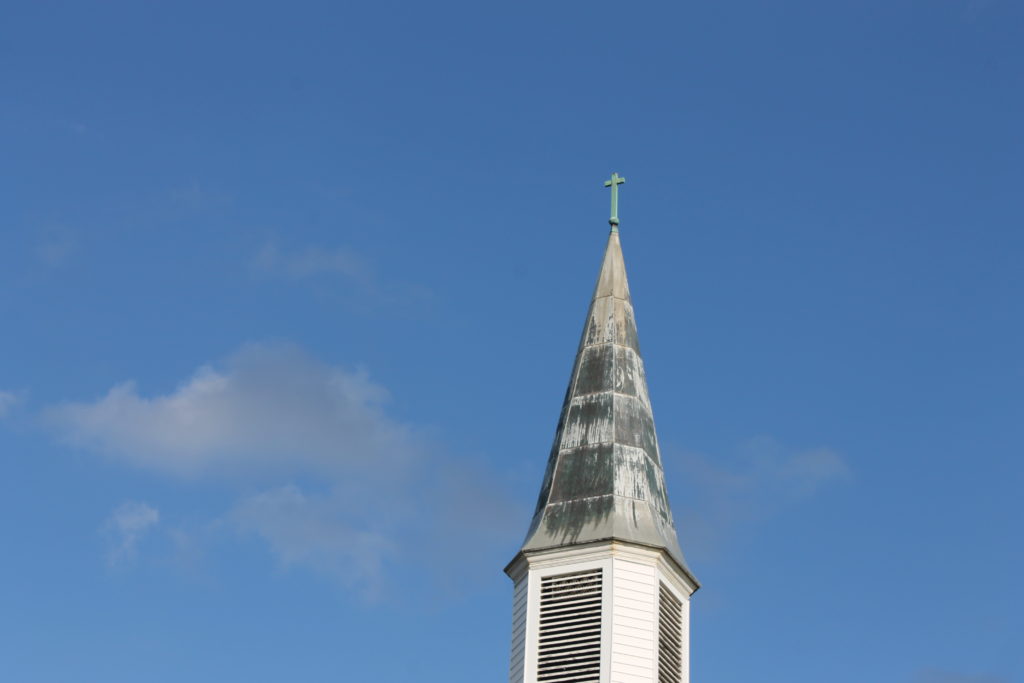
We are theologically descended from the Methodist Episcopal Church and the Evangelical United Brethren Church (the two denominations that merged to form the United Methodist Church. As such, we follow in the footsteps of the teachings of John Wesley, Charles Wesley, Francis Asbury, and Thomas Coke, among others. [You can find out more about them and their teachings online. See our reference page.] This means that the package of things that make us distinct from other denominations are that we believe in:
ORIGINAL SIN
We believe that all people are estranged from God in their natural human state. This estrangement is named “sin” in the Bible, and is descriptive of every human being who has ever lived. The story of Adam and Eve in Genesis 3 is, therefore, not just the story of the first two people, but also our story.
GRACE
While we are all sinners, God offers us the power to live a holy and righteous life, moving back into relationship with Him. The Bible calls this power “grace.” John Wesley taught that this grace comes to us in three ways. First, there is prevenient grace. This is the grace that God showers upon us before we know anything about Him, setting the stage so to speak for us to be able to hear the gospel message. Second, there is justifying grace. This is the grace that enables us to hear the gospel message, and respond, repenting of our sin, and accepting Jesus as our Savior and Lord. Finally, there is sanctifying grace. This is the grace that helps us mature in our faith, and enables us to truly live as children of God.
NEW BIRTH
As the giver and sustainer of all life, God not only created us physically, He also re-creates us spiritually when we enter back into relationship with Him, making us into an entirely new creation in Christ. Some have referred to this reality as being “born again.”
FREEDOM OF THE WILL
While God offers us grace, and invites us to experience new birth, He does not force us to receive it. Therefore, those who are saved are not those whom God has somehow predestined before time to be His followers, but those willing to accept His offer of salvation.
HOLINESS
The message of salvation is not just for some future time after we die. God intends us to experience His peace, love, and joy in this present world. The only way this will happen, however, is if we – in the power of God’s amazing grace – seek Him with all our heart, soul, mind, and strength. If we do, then His Holy Spirit will not only make us into a new creation (as noted above), but will then perfect that creation so that we once again take on the “image” of God in all we do and are.
HUMAN WORTH
While we believe that in our natural human state, we are estranged from God, “sinners’ to use the words of the Bible, we do not believe that sin totally obliterated the image of God in which we were originally created. For this reason, every person is of worth to God, even when they continue in their wayward paths. Because of this, every person should be treated with dignity, respect, and love, even when they are being invited to walk away from a sinful life and return to God.
TOLERANCE
Since every person on earth was originally created in the image of God, and therefore has worth, every person on earth is someone whom God is trying to not only save, but use to save others. As we each go about this process of accepting God’s grace for ourselves, experiencing new birth, and moving toward holiness, we may occasionally ‘bump’ into others on that same journey, as well as those who have not yet begun the journey. In such encounters, God calls us to remember that we are not Him, and that only He has the right to judge others, and make ultimate decisions about their eternal destiny. This should lead us to then be tolerant of those around us, knowing that God will one day separate the wheat from the chaff.
SOCIAL CONSCIOUSNESS
The Bible tells us that as God created the world, He declared it to be good. The Bible tells us that God so loved “the world,” that He sent His only begotten Son into it to redeem it. And the Bible tells us that God has given us a “great commission” to represent Him in this world, bringing about holiness in the lives of all people, treating each person on earth with the worth they hold in God’s eyes, and being tolerant of those who stand in different places than we stand. Because of that, we – like John Wesley – see “the world as our parish.” This means that we are not only interested in having people become a Christian so they one day go to heaven, but also ensuring that they live in a just and peaceful world, that the planet on which this happens is cared for, and that all living things within it are treated with the same compassionate love that Genesis tells us caused God to create them in the first place.